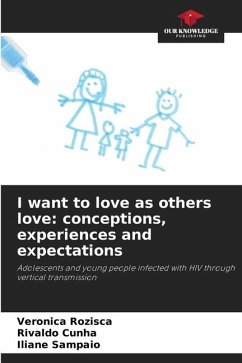
"They Never Want to Tell You"
Children Talk About Cancer
Versandkostenfrei!
Versandfertig in 6-10 Tagen
60,00 €
inkl. MwSt.

PAYBACK Punkte
0 °P sammeln!
They Never Want to Tell You transcends the negative metaphors and clichés of life-threatening disease, to give voice to the culture of cancer and to the behavior and attitudes of those who function within that culture-as patients, medical professionals, family, and friends.In these extraordinary narratives, children coping with cancer reveal their most personal experiences, and they speak with a candor that breaks through the cultural taboos ostensibly designed to protect us from the disease. The rich, compassionate, and honest words of these children give expression to concerns that adults w...
They Never Want to Tell You transcends the negative metaphors and clichés of life-threatening disease, to give voice to the culture of cancer and to the behavior and attitudes of those who function within that culture-as patients, medical professionals, family, and friends.
In these extraordinary narratives, children coping with cancer reveal their most personal experiences, and they speak with a candor that breaks through the cultural taboos ostensibly designed to protect us from the disease. The rich, compassionate, and honest words of these children give expression to concerns that adults who are struggling with cancer find nearly impossible to articulate. Free of social conventions and cognitive distortions, each story presents a powerful variation on the theme of survival in the face of the continuing uncertainties of life-threatening disease.
Bearison, a developmental psychologist and psychotherapist, is keenly aware of the psychological impact of cancer on children, particularly as survival times for childhood cancers lengthen and complex treatments intensify concern about the emotional-not merely physical-well-being of children. Bearison has culled from scores of interviews the most salient moments that represent these individual children in their shared struggle with disease. In these pages the children express their wildest hopes and worst fears about cancer. They speak of the absolute necessity of full disclosure, the problems of relating to friends and family, the difficult adjustment to hair loss, their feelings of punishment, grief, and spirituality, and many other issues. In the course of these stories the children reveal not only their will to survive and their extraordinary capacity to understand themselves and their condition, but their altruistic desire to share that understanding with other children as well as with adults who have cancer. "They Never Want to Tell You" is rich and rewarding reading for cancer patients, their families, and health-care professionals alike.
In these extraordinary narratives, children coping with cancer reveal their most personal experiences, and they speak with a candor that breaks through the cultural taboos ostensibly designed to protect us from the disease. The rich, compassionate, and honest words of these children give expression to concerns that adults who are struggling with cancer find nearly impossible to articulate. Free of social conventions and cognitive distortions, each story presents a powerful variation on the theme of survival in the face of the continuing uncertainties of life-threatening disease.
Bearison, a developmental psychologist and psychotherapist, is keenly aware of the psychological impact of cancer on children, particularly as survival times for childhood cancers lengthen and complex treatments intensify concern about the emotional-not merely physical-well-being of children. Bearison has culled from scores of interviews the most salient moments that represent these individual children in their shared struggle with disease. In these pages the children express their wildest hopes and worst fears about cancer. They speak of the absolute necessity of full disclosure, the problems of relating to friends and family, the difficult adjustment to hair loss, their feelings of punishment, grief, and spirituality, and many other issues. In the course of these stories the children reveal not only their will to survive and their extraordinary capacity to understand themselves and their condition, but their altruistic desire to share that understanding with other children as well as with adults who have cancer. "They Never Want to Tell You" is rich and rewarding reading for cancer patients, their families, and health-care professionals alike.












